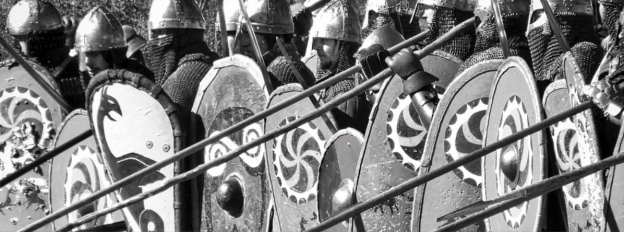Summary
Throughout history it has been common for soldiers, in heading into battle, to pray and ask God’s favour for their cause. The people of Israel in the Old Testament also sought God’s favour when they went into battle. They recognised that God, their covenant-keeping Great King, was a mighty warrior and that all their warfare must be under his will and command.
Psalm 20 appears to be a psalm written for singing (in prayer) before battle by God’s people. The psalm splits into prayer before battle, praise for God’s anticipated victory, and petition for God’s king. In this psalm, we see a reminder that as we do battle with sin it is God we must ask for help, and God who gives.
Our passage explained
v1-5
The first five verses of Psalm 20 offer a prayer before battle. This comes from the people, addressed to the king and his troops: “May the LORD answer you in the day of trouble!
May the name of the God of Jacob protect you!” (v.1) The people pray that God would protect and listen to the king, who embodied the people as their leader before God, as he and his army seek God’s protection.
The prayer asks that God would provide help and sustaining power. “May he send you help from the sanctuary and give you support from Zion! May he remember all your offerings and regard with favor your burnt sacrifices!” (vv.2-3). They ask that God would send help from his special dwelling place with his people, the temple in Jerusalem (often stylised as Zion in the Psalms) which was God’s “palace” in their presence.
The people also ask that the offerings and sacrifices, presumably offered before battle, would be accepted by God. These offerings sought atonement for sin and also showed the dedication of the sacrificers to the service of and covenant relationship with God. As their covenant king, the people would expect that God would help his faithful servants who sought to serve him, and trusted him for forgiveness and deliverance.
Going to battle, the king would have had plans for victory and defeating his (and God’s) enemies. In verse four, we read that the prayer before battle asks “May [God] grant you your heart’s desire and fulfill all your plans!” The people seek God’s blessing on the king and his army as they march to battle.
In verse five, the prayer looks forward to victory. “May we shout for joy over your salvation, and in the name of our God set up our banners! May the LORD fulfill all your petitions!” They pray that they will be among those who rejoice with the king and his army over their victory, as God saves them from defeat.
v6-9
The psalm moves from prayer to praise in verses six to eight. God’s people express their trust in God’s power to save, as they sing “Now I know that the LORD saves his anointed; he will answer him from his holy heaven with the saving might of his right hand.” The people clearly attribute the victory they anticipate to God’s saving hand, acknowledging it is God who intervenes to give victory to the king and the people.
In verses seven and eight, the people express their confidence in God, not force of arms, to deliver. “Some trust in chariots and some in horses, but we trust in the name of the Lord our God. They collapse and fall, but we rise and stand upright.” Chariots were the tanks of David’s day, but while the nations around trusted in military might, God’s people trust in the Creator God to destroy even the finest weaponry and the most powerful armies.
The psalm concludes with a petition for God’s king in verse nine. “O LORD, save the king!
May he answer us when we call.” The people conclude their battle song by again asking God to deliver the king, and expressing their hope God would respond to their prayers when they petition him.
Our passage applied
As pilgrims on earth we do not have a piece of territory which is ours and over which we fight, but instead dwell among the nations, witnessing of God and his wonders. Paul says “we do not wrestle against flesh and blood, but against the rulers, against the authorities, against the cosmic powers over this present darkness, against the spiritual forces of evil in the heavenly places” (Ephesians 6:12).
While we wrestle against the cosmic powers of this present darkness, the spiritual forces of evil, and our own sinful hearts, this psalm reminds us that our strength is found in God, not us. Like the saints of old, we should pray that God would be with us, helping and sustaining us in the struggle, and win the victory for us. God has promised he will deliver us from our enemies to dwell with him for eternity.
As we pray for our deliverance, we can also give thanks for our anticipated victory in Christ. Because it is God who we trust to deliver us, not the strength of our own hand.
Resources
Questions? Please contact us. Inspired? Come and worship with us on Sundays.


